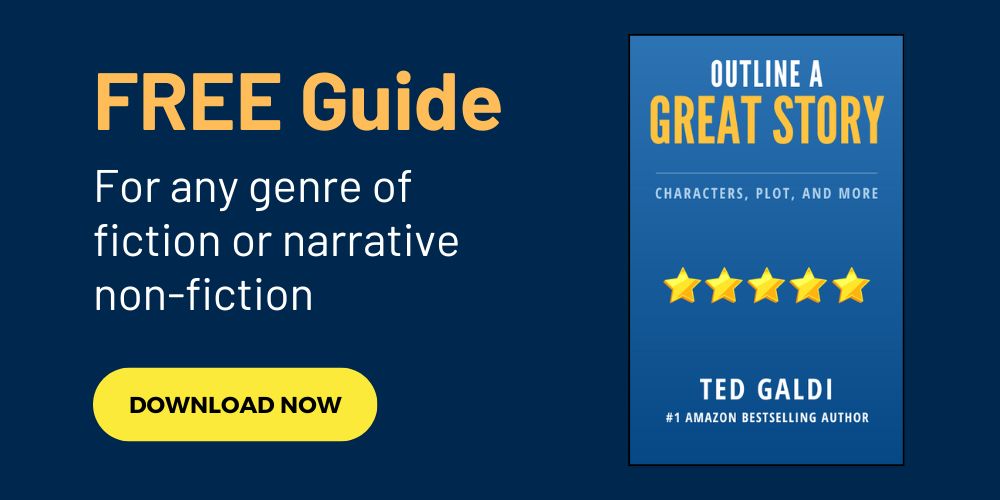Narrative Writing: Types and TechniquesFind out what narrative writing is and learn how to make yours excellent with these 10 tips. Writing a book or screenplay? Download my FREE story-outlining guide. What is narrative writing?Narrative writing is the process of telling a story via written words. Two major categories of narrative writing exist: fiction and narrative non-fiction. Fiction is the telling of stories that didn't actually happen in real life, while narrative non-fiction is the telling of stories that did. At a basic level, a story is a communicated group of events that centers around at least one subject character and builds to a conclusion about those events. The subject character is typically a person, but can be an animal, mythological figure, or any other type of entity with the capacity to think (whether real or not). You can't write a story about a rock in the dirt. At least one character needs to be conscious. Technically, for a story to meet the definition of narrative writing, it should be written down. However, spoken stories follow a similar flow. When you were a kid, did something wild ever happen to you and a couple friends, then you told a bunch of your classmates at school the next day? If so, you've already done something that's almost identical to narrative writing - all that was missing was writing the story on paper, typing it on a computer, etc. What are examples of fiction writing?Fiction writing mainly covers novels, short stories, comic books, plays, screenplays (the written basis of a movie), and teleplays (the written basis of a television show), though does span other formats. As long as the events in the story aren't a direct retelling of actual ones, the story is considered fictional. Often, fictional stories are inspired by real incidents, though aren't a direct account of them. For example, in real life, a screenwriter may have witnessed a person rescuing somebody from a burning car. After the writer got home, he was motivated to write a story that opens with someone pulling somebody else out of a vehicle in flames. However, since the writer invents the characters in the story, and places them into various invented situations after the rescue, this story would be considered fictional. What are examples of narrative non-fiction writing?As mentioned, non-fiction writing involves stories that directly chronicle real events. However, not all non-fiction writing is considered narrative. For writing to be considered narrative non-fiction, it needs to unfold like a story. Again, that means it unfolds as a communicated group of events that centers around at least one subject character and build to a conclusion about the events. For instance, chronicling the rise of a real musician from unknown performer to world-famous singer would be considered narrative non-fiction. It centers around a subject character (the singer) and events that build to a conclusion (the gaining of notoriety as a musician). Books like biographies and memoirs are considered narrative non-fiction, as are journalism articles that tell real stories about real people. A news article about the weather, for example, would not be considered narrative non-fiction - though the article is covering a real topic, it lacks a subject character. On the other hand, a magazine or newspaper article on a real person wouldn't be considered narrative if it only listed highlights from the person's career (ex, a profile) or briefly reported on some event the person was involved in (ex, mentioning the person won a local pie-eating contest). However, if an article went into depth about challenges a person went through and how those challenges shaped the person's life, the article would be considered narrative. 10 tips for narrative writing
Fiction vs. non-fictionFiction writers have more flexibility than non-fiction writers when implementing these tips. Since fiction writers are making up a story, they're not confined by the limits of real-life events. Non-fiction writers, on the other hand, need to stay true - at least to some degree - to the real-life material their writing project is based on. Non-fiction writers should look for angles in the material that lend themselves to the storytelling techniques described above. For example, if you're writing a story about a historical figure, you can cover the person's childhood, adolescence, or adulthood. Further, you can write about specific eras within each of those periods, or even narrower, specific years, weeks, or days. My advice is to first seek out a worthy antagonist in the person's life. Possibly, as a child, the historical figure had some struggles, but they weren't in relation to another person in particular. However, while an adult, the historical figure had a strong political rival. You can build a dramatic story around this clash. Sure, your story can cover all aspects of the subject character's life, however, I'd spend much more page space on the dramatic conflict between hero and villain during this particular stage of adulthood. Want more writing tips?Be sure to download my FREE outlining guide. It applies to fiction and narrative non-fiction, across all genres, such as:
You might also like my post on how to market a book online.
0 Comments
Leave a Reply. |


 RSS Feed
RSS Feed